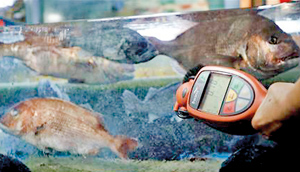Sunday Times 2
S.Korea extends Japan fisheries ban as Fukushima concerns grow
View(s):SEOUL/TOKYO (Reuters) – South Korea extended a ban on Japanese fishery imports to a larger area around the crippled Fukushima nuclear plant due to growing concerns over radiation contamination. Further fuelling those concerns, the plant’s operator Tokyo Electric Power Co, or Tepco, said it was “very concerned” that radioactive water could flow towards a bypass it is digging to divert clean groundwater around the damaged reactors and into the sea.

An employee at a fisheries wholesale market places a geiger counter on a water tank containing Japanese snappers to check for possible radioactive contamination (REUTERS)
The bypass is a key element of the company’s attempts tocontain an escalating problem of irradiated water at the nuclear facility that was knocked out by an earthquake and tsunami in March 2011. The Korean move – widening its ban to cover imports from eight Japanese prefectures, including Fukushima – came as Japan’s Prime Minister Shinzo Abe broke away early from a Group of 20 Summit in Russia to pitch Tokyo’s bid to host the 2020 Olympic Games, with assurances that the Japanese capital would be safe for all those coming to the Games. A decision by the International Olympic Committee is due.
A spokesman for the South Korean Prime Minister’s office said the measures were due to “the sharply increased concern in the public about the flow of hundreds of tonnes of contaminated water into the ocean” at Fukushima. The indefinite ban, which takes effect on Monday and affects some of Japan’s biggest fishing areas, adds to international pressure to fix the crisis at the Fukushima plant, 230 km (140 miles) north of Tokyo.
China has banned imports of dairy, vegetable and seafood products from at least five Japanese prefectures, including Fukushima, since the disaster. Korean Vice Fisheries Minister Son Jae-hak said information received from Japan was not good enough to properly judge the situation, and Seoul will also tighten testing on fisheries imports from other parts of Japan.
South Korea imported 5,000 tonnes of fishery products from the eight affected prefectures last year, out of a total of 40,000 tonnes of imports from Japan, Son said. Tepco admitted in July, after months of denials, that contaminated groundwater was leaking into the sea.
Yoshihide Suga, Japan’s top government spokesman, insisted the country’s fisheries exports are safe for consumption, with stringent inspection procedures in place. Toxic water is confined to a small bay near the Fukushima plant and, even there, he said, radiation readings are well within permitted levels.

“We have been providing relevant information to the South Korean government,” Suga told reporters. “We would like South Korea to take steps based on scientific evidence.” Tepco said last month that 300 tonnes of toxic water leaked from one of hundreds of tanks assembled to store contaminated run-off, and it has since found radiation hotspots in three other holding areas. As the sense of crisis has escalated, Abe’s government this week pledged nearly half a billion dollars to help Tepco try to contain the contaminated water.
comments powered by Disqus
